Great by choice
by James C. Collins
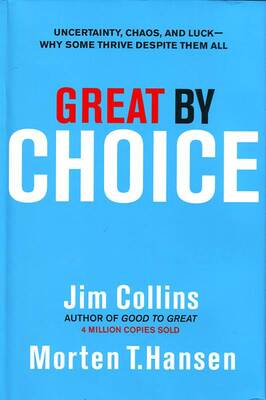
Great by choice is a book about research that answers the question: why do some companies thrive in uncertainty, even chaos, and others do not?
The book is based on research, has many examples and very engaging. It serves all of that with amazing structure including handy chapter summaries.
It is a bit too detailed to my liking in some places.
Below are my favourite highlights
Update: I read some criticism of Jim’s research and there are some very strong points. While his research methods might be good (there are enough criticism about it as well) the issue lies in a small pool of companies. Statistically it’s very easy to get false positive when you have only 20 companies to look at.
There are two videos which expand on the issue with such research - About p-hacking: https://www.youtube.com/watch?v=42QuXLucH3Q - And how data is random https://www.youtube.com/watch?v=1tSqSMOyNFE
The Four
by Scott Galloway
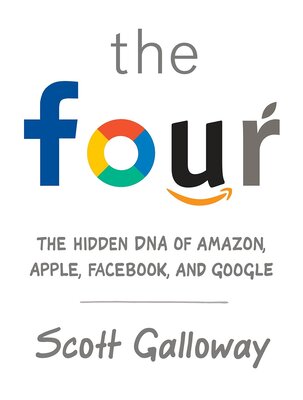
The book includes the short analysis of Amazon, Apple, Facebook, and Google along with future prediction. It was an interesting listen but I didn’t make any notes.
The Alchemist
by Paulo Coelho
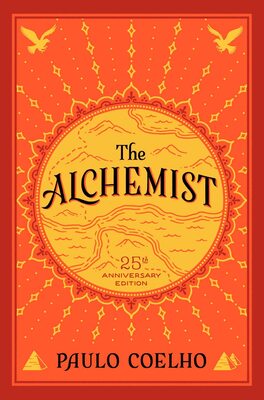
Hah! I listened to this book a long time ago but seems like I didn’t blog back then. Luckly I decided to listen to it again.
I think it’s safe to call this book classic. It’s very popular and highly rated, while was written 30 years ago. It has great story, good character development and all of that is interweaved with life lessons. On top of that is fairly short, so I highly recommend it.
Хулиномика
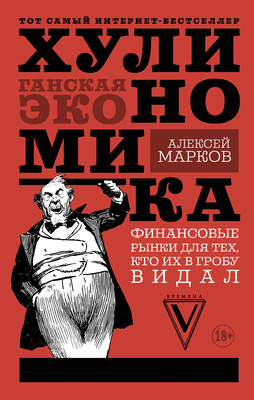
This book gives a good introduction to ecomony basics. It quickly touches on a lot of concepts so don’t expect to get a good introduction. The author prioritises cool slang over explanation simplicity. This book is very entertaining indeed, but having the basic knowledge myself I found it had to follow.
Brave New Work
by Aaron Dignan
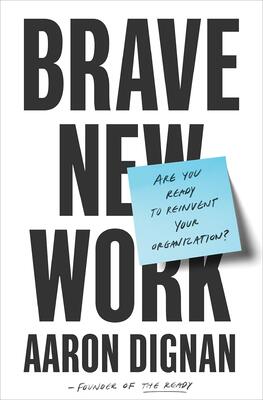
Overall this book is a good introduction into new way of working. It compiles a lot practices into place. It doesn’t go in depth but it shows you the direction you can explore yourself.
The key idea is to rethink how we interact and do work. It gives a new framework to think about the change. The book starts with establishing the ground work and introducing the new concept of Organisation debt.
Rough Consensus
by Internet Engineering Task Force (IETF)
I'm very excited about Rough Consensus. Democracy is built around the majority. It works great when all voters are at the same high level of expertise. Unfortunately that can't be further away from reality. For example in voting: "Don't let ignorant people vote".
In practice nobody knows everything, so we should respect our differences. The core idea of Consensus: the lack of disagreement is more important than agreement. The focus on the flaws helps to drive the discussion and share the knowledge of the minority to the rest of the group. It's a way to pick the best option, and not the popular option.
I highly recommend to read the original paper: On Consensus and Humming in the IETF. It explains how to do it and the mistakes to avoid.
High Performance Habits
by Brendon Burchard
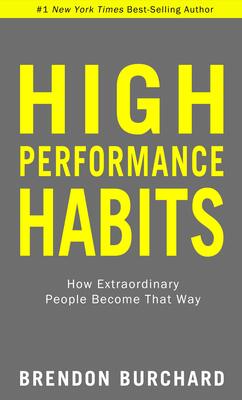
I like this book because it's practical. I also hate it in places because it feels like the book couldn't qualify as a best seller without completely unnecessary chapters. The book can be very useful if you can finish it.
First of all few words about the author. It's hard to respect Brendon when he is proud that he wrote a book in 1 month (not this book). Author who seeks success while openly claiming that good research is unnecessary. You will see that while reading it. Few chapters are written around author's personal stories and claims based on it. So yeah, who needs research?
The best part the book is very well structured and easy to follow. The content is weak in places, but there is nothing that conflicts with my personal experience, so it's easy for me to accept it even with weak arguments.
The book presents 6 habits and 3 common mistakes/traps.
Theory of Human Motivation
by A.H. Maslow
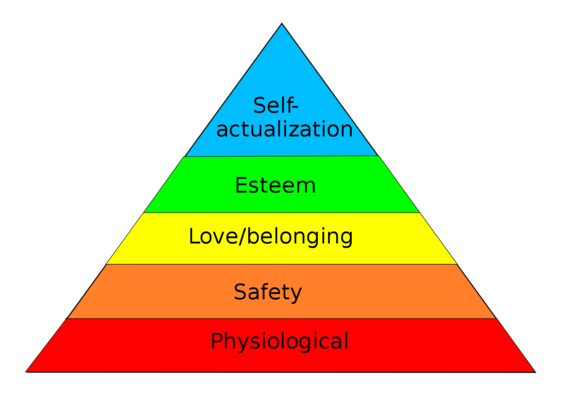
Everybody heard of Maslow's hierarchy of needs. I was curious to know more about it than what's in wikipedia so I read the original paper called "Theory of Human Motivation".
To remind you, the paper was written in 1943 and it's one of the best reads I've done. Modern books prioritise the high words count. The paper is opposite of that. It is very concise and full of references.
To my surprise only the first half of the paper talks about five levels. There are so much more to it! The second half argues that the hierarchy is not rigid. It was never meant to fit everybody and be 100% accurate. I think that's a very important part that got lost in the process of over-simplification to a single image of a triangle.
It was pleasing to see the author arguing both sides of the argument. The paper mentions the limitations of the proposed model, exceptions and areas for the further research.
Anything you want
by Derek Sivers
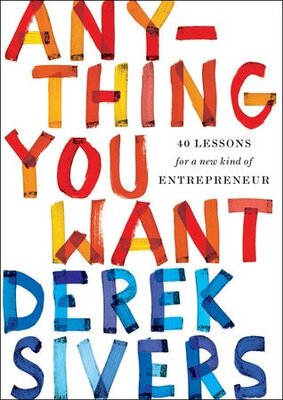
This is extremely dense book. It wins extra points for being concise. You can read it in hour or two. There is also audiobook read by the author.
I still can't make my mind about Derek. It's either he is genius and hiding it very well. Or he is the most naive and luckiest man. Either way read the book, it's worth it.
One thing really surprised me. Derek talks about completely different attitude of running a business. Every single business I know is there for one reason — money. You might think that's the best way to run the business. Sure, but it's definitely a survivorship bias. Money focused business might live longer but it's like a walking dead — it ruins the scenery.
It's rare to find customer focused business. Everybody says they focus on their customers. Yeah right, as long as their business is growing. Are your customers really interested in your business growth? I don't think so. They are interested in a great service/product. In fact larger companies tend to have worse service than their small competitors.
The author's mindset is similar to Basecamp. Focus on customers. You are not going to need it. Adjust as you go. No funding.
Quick notes:
I like his "HELL YEAH! or no" principle. I saw it many years ago and it got stuck with me for all that time.
Delegate or die: Answer the question and explain the thought process and philosophy behind the answer.
Trust, but verify: Remember it when delegating. You have to do both.
A real person, a lot like you: Technology depersonalises humans, but there are people on the other end, remember that.
Quote from Steve Blank: No plan survives first contact with customers.
You should feel pain. If you do you will always know what to improve.
If you like the book I would recommend to follow Derek's blog.
The Phoenix Project
by Gene Kim, Kevin Behr, George Spafford
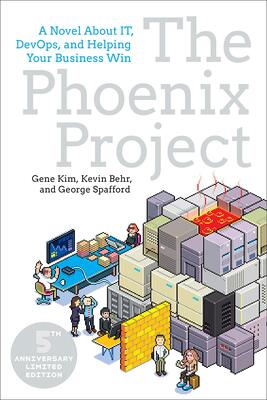
This is a great technical story. I find it hard to explain my daily job to a non technical person. This book is the best example I've seen which closely resembles what the tech work is like. It's not the perfect match but the closest I've seen by far.
The story's realism keeps holding your attention till the end. The book is well paced and full of management lessons. Few highlights which I enjoyed:
"Free puppy" analogy. When what you think is free ends up costing you a lot over the years. I find people tend to favour short term thinking unfortunately.
Management of key resources and bottle necks at production factories and office jobs.
The book brings attentions to 4 types of work in tech teams:
- Business projects
- Internal projects
- Changes
- Unplanned work
And my final observation, just like in real life, managers in the book don't have formal management education.
The book focuses on the management aspect of work. I would recommend this book to experienced tech people, because they will appreciate it more. If you are outside of tech and want to get a glimpse into the daily lives of tech management jobs have a look as well.
Shape Up. Stop Running in Circles and Ship Work that Matters
by Ryan Singer

It is available online.
Shortly after I finished Inspired book Shape Up book came to my radar. After reading this book the whole puzzle got together. The pieces:
- 37 signals is a software company that develops Basecamp
- Basecamp is a project management and communication tool
- Basecamp is used by 37 signals to develop Basecamp
This book serves well as a guide on how to use Basecamp. The closer your process is to this book, the more useful Basecamp will be for you.
It’s important to note that Basecamp is a cash-cow. The quality of the development process is not necessary affects its success. Read the book with a grain of salt.
Their process is also Dual Track. The first stage is exploration and the second is development. However unlike in Inspired, it’s not clear if they ever do user testing. The book is very practical and it’s easy to see that it evolved over time.
I find Shape Up process very reactive as they discourage having backlog. I agree with the principle that important ideas will always come back, so you don’t need to record them. However they went to the extreme to reinvent the road map every 2 months. Basecamp doesn’t feel like a product but a playground for its founders.
I think the book will gain popularity because it’s short and free. It would serve as a good introduction to dual track processes. I will recommended it on this basis to others.
Inspired: how to create products customers love
by Marty Cagan
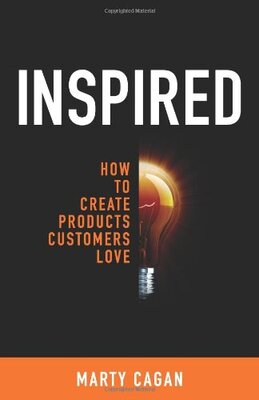
My friend is a big fan of Marty Cagan. He is so impressed by his work that it made me think I’m missing out, so I’ve decided to read it. Inspired is a book for product managers about product managers by product managers.
Let’s start with important things first. I loved it. My career is a decade old and I was surprised how little I knew about product development. This book taught me a lot. What product managers are, what they are not, what they do, how to hire and how to work with them. It’s probably the most comprehensive book on a single topic.
The mind blowing discovery for my was at the end. The author is highlighting through the book about the difference between normal agile coach and the one who worked in product team. It’s only at the end of the book he explains the difference. Scrum as the most popular agile methodology is created in consulting (custom software in the book). It works amazingly well in such setup and it is completely unsuitable for product teams. I knew it myself deep inside, but verbalising it made it real. I like agile manifesto. With that the new knowledge 12 principles behind the Agile Manifesto opened up from a completely new perspective.
Our highest priority is to satisfy the customer through early and continuous delivery of valuable software.
It’s great for consultants, pointless for product teams.
The process the author proposes is something between waterfall and agile. In short you don’t develop anything until you’ve proven the prototype and business model. I was very skeptical at the start but finally got convinced that it is a good process to use. The book does not give it a name, but people call it Dual Track Development.
On the first track you explore ideas, come up with prototypes and test them on users. The idea is to keep the feedback loop tight and iterate on ideas. On this track all roles must be involved, including developers. That avoid the problem with waterfall model where levels don’t communicate.
The second track is usual development process. That could be Scrum, Kanban or chaos driven development.
Both tracks run in parallel, but with different cycles.
If you test an idea and it fails, you just scrap it and move to the next. The BIG difference to plain agile you don’t pollute your code base with bad ideas. Also when you start development you already have well designed, tested and proven feature. No more assumptions and no more pivoting.
Even though the book is mostly for product managers, I found it very useful, so would recommend it to everybody who is in software development.
Atlas Shrugged
by Ayn Rand
This is a second time I listened this book. It wasn't a standard audiobook, but audio theatre with multiple voices and sound effects.
I enjoyed it like the first time, but also picked up the bits that I missed before. That allowed me to enjoy the book even more.
I better understood the characters and the love narrative. My original critic is only partially relevant now. Turns out I didn't get it the first time.
This time I spent more time researching the Objectivism, which is the main philosophy in the book. I found that hard to navigate and differentiate philosophical terms. It's like learning chemical elements without periodic table. Would be great to get some framework for different philosophies.
Peopleware
by Tom DeMarco & Timothy Lister
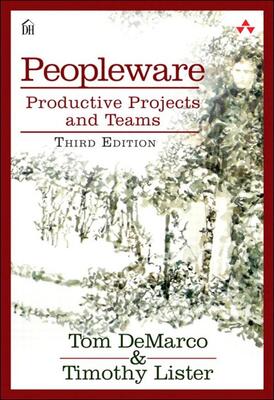
I love the title of this book, it can't be said better. The book was release in 1987 and had its third edition in 2013. The content is still relevant to this day, but sometimes it feels dated.
This is a great book, but I'd say hold off from reading it until you get into managing people. Then this book becomes invaluable resource. It describes the work dynamics from the social perspective and even touches on a big topic like happiness in life.
The book confirmed and cleared a lot of my observations. My three highlights:
Software quality is a cult. Not striving for the best is the common mistakes most companies do. It's not just cutting corners but has an enormous psychological consequences. One of them is job satisfaction. By pushing dev speed over quality you rip the most important part for developers, to be proud of the craft. You might say the speed to market is the king. Sure, but don't be surprised when developers resign.
Hidden hiring costs. It's not so hidden, just ignored. Based on my estimates it costs 50k to hire new candidate. The average employment duration is 2 years. It means you pay 25k per year per hire. It's ironic when company wants to save 5k and not to match the salary offer of the resigning employee. People overvalue simple numbers and ignore more complex ones. The short story, value your people while you have them, otherwise you will pay for it. Even if you spend 20k in perks per employee per year, you should celebrate your decision. It made your employee happier and you saved 5k.
I also enjoyed the chapter on introducing change to organisations. I was burnt in the past when I wanted to improve things. I leant the lesson: people really hate to change. The chapter shows a technique to ease the transformation. Each change needs a catalyst. You need to show and convince the people that the status quo is wrong. The catalyst should create the chaos, the bigger — the better. Only after the people are scared enough you can introduce your idea as a solution to the chaos.
The book sounds too good to be true, but I like the reasoning. I wish it had more to back it up, to build my confidence in the content. But as mentioned above, this book is highly recommended.
The Barefoot Investor
by Scott Pape
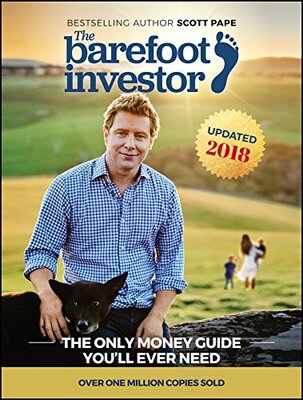
I'm pretty good with money (at least I'd like to think that). However I lack a lot of common knowledge about Australian rules. For example how super works or what happens when your bank goes bankrupt. This book is mostly relevant to only Australians, as financial system differs in each country.
The book present a simple step by step guide on how to take your financial life under control. Starting from the bottom of owning a lot of debt up to getting the financial independence. This book is recent which is important as the content is time relevant.
The books proves a good general knowledge and a must read for all Australians.
Tribal Leadership
by Dave Logan, John King & Halee Fischer-Wright
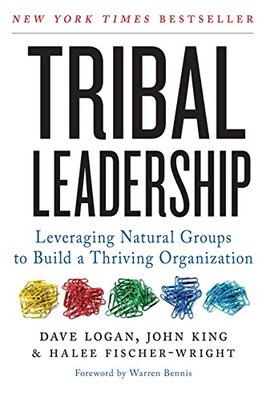
Great book! It talks about tribe (group of people) culture. It's mostly described in the context of work organizations. The book is inline with my own experience. I saw it as the explanation of the things I didn't see at the time.
The content is very well structured and to the point. It has a good balance between stories and actionable steps.
You can download free audiobook. You'll need to go through 5 pages to get the file, but it's worth it.
If you've achieved competence in your career, this book is a must read for you.
I will read the book the second time to better understand it. One audiobook wasn't enough to fully appreciate the insights.
Measure What Matters
by John Doerr
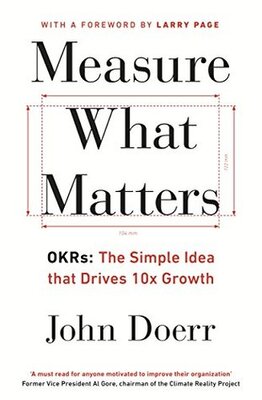
I do not recommend this book. The book brags about success stories. If at least one employee heard of OKRs, the author would claim the company's success solely to OKRs. This book takes survivorship bias to the extreme. What this book does not talk is how the mentioned companies, including OKR mother-ship Google, constantly fail. You might assume those teams didn't implement OKRs correctly. However the book does not tell you the correct way and you have to figure out it for yourself.
Without that, it's a pigeon superstition:
However I would recommend the resources at the end of the book.
Don't get me wrong, the topic of goal setting and uniting teams is very important. OKR is a fancy word for the goal setting and it creates more confusion. Without understanding of OKR implementation details it's too easy to fall into cargo culting.
Tribes: We Need You to Lead Us
by Seth Godin
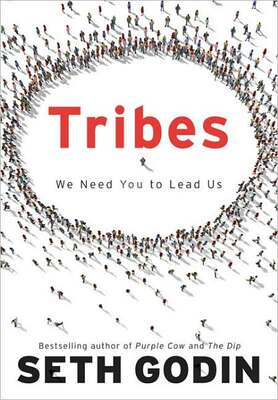
It's a weak book. The author's style of writing doesn't help either. The continuity breaks, thoughts jump and the lack of structure make it hard to build the understanding.
There are few good quotes and thoughts, but unless you are into group psychology, don't waste your time. The only reason to read this book is for completeness on the topic and to see the different perspectives.
The dip - A little book that teaches you when to quit (and when to stick)
by Seth Godin

That's a last book for the year. It's very short and has a very clear message. The title says it all. I love it a lot. However I'm biased as my opinion is inline with the book.
I've discovered that the book splits people into two opposite sides. The question is simple, so I've found everybody have an answer for it. Do you think you should be the best in what you do?
I would recommend this book, does not matter what your answer is. It's worth 1-2 hours reading.
The power of habit
by Charles Duhigg
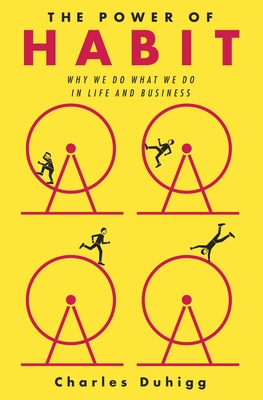
I'm a big believer in habits and picked this book specifically for this reason. The book has three parts: individuals, organizations and society.
The individuals part is the best. It explains the habits in a structured form. There are a lot of insights and knowledge that you can apply yourself.
In the second part that the book starts to go down hill and it goes fast. There a lot of interesting stories, but no analysis. It is the same problem as Charles' another book Smarter Faster Better, which I've read few months earlier. Entertaining to read - useless in building understanding. Most stories have too many unnecessary details. Chapters are hard to relate among themselves and the book lacks purpose. It's very disappointing, but fun at the same time.
"Habit" is a big word for this book, which it does not deserve. More accurate name would be "Stories about influencing people".
I would recommend to read the first part about individuals. You can skip or skim the rest.
The bed of procrustes
by Nassim Nicholas Taleb

That's my beach book and it's a great fit. Short aphorisms are quick to read and give you a lot of opportunity to think about them. I didn't understand the half of the aphorisms, which gives a reason to read the book again.
Domain-driver design distilled
by Vaughn Vernon

I've found this book very insightful. It talks about modeling the application based on domain or real business terms and operations. My development experience slowly led me to the same conclusion. DDD is very valuable technique and it should be more talked in the software industry.
I can't remember seeing the DDD concept in the book yet. While the book's content is great, the delivery is horrible. I found it to have a bad flow, being too long and slow at times and often confusing. The more appropriate title would be "DDD Half-Distilled". I feel the content could be cut in half without significant drop in value.
Handbook for new employees
by Valve

I've picked this book for the second book club meeting. It is short and publicly available. The book provides interesting insight into the company, which is successfully operating with flat structure for 20 years. It's so different so it's hard to believe it.
The most surprising part for me was about hiring as it is considered the most important task in the company. I agree with such approach, but unfortunately it's not so common.
Few other things I've liked: T-shape people, peer reviews, cabals, stack ranking and compensation.
The book gives a good overview of the culture. I really want to know more details how everything is setup. That's where the real insight.
Scrum: The Art of Doing Twice the Work in Half the Time
by Jeff Sutherland

Great books and great methodology. It would be even better if the author didn’t oversell it. The way he presents it, is like he treated all diseases on the planet. After a while of such praising of his work you start to question his credibility.
The author made a good point. You can't significantly change the performance of a person in a short time. However you can significantly affect the team. Everything should be seen as a system. People are just the participants in the game.
There are no bad people, but bad systems
The book made me think of Nazism. Its success can be explained by the system that was in place. Most german people didn't want to kill anyone on the individual level. However they played their cog role in the complex Nazism machine.
Anyway, back to the book. Scrum is focused on providing the basic rules for the process in the team. It prioritises efficiency, uncertainty and change. I can't think how those rules could be distilled even more. That make me think the scrum would be around for a long time.
I would recommend this book to everybody. But don’t be put off by the writer. The product does not change because of the bad salesperson.
Smarter Faster Better
by Charles Duhigg
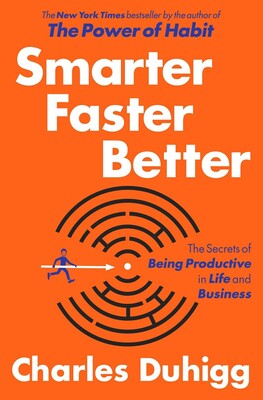
This was an audiobook, and I did an experiment with it. I’ve listened to this book three times in a row. The goal was to see how the second and the third rounds would be different.
After the first round, I liked the book. Each point is backed by real life example. That makes the listening a joy.
The second round wasn’t much different. I’ve picked up some missed details. However overall understanding of the book is only improved by 10%.
For the last round I created a mind map while listening to it. To my surprise that made a huge difference. The mind map forced me to become an active listener. The overall understanding doubled. That shocked me because that was the third time I’ve listened to it.
My favorite part is about goal setting. There are ‘smart goals’ and ‘stretch goals’. Smart goals are achievable and measurable. These are your everyday goals. They prioritise efficiency of what you are already doing. In contrast stretch goals are about the direction.
To better understand them, think of the running analogy. Smart - is how fast you are running. Stretch - is where you are running to.
While the book has a great content, it feels disjointed. It would be nice to combine all knowledge into a recipe to follow. I guess it’s up to the reader to do so.
Payoff: The Hidden Logic That Shapes Our Motivations
by Dan Ariely

Yet another interesting book from Dan Ariely about behavioural psychology. The book talks what motivates us at work. It feels that book heavily overlaps with author's other books. It's good to remind about those things anyway.
Dead Souls
by Nikolai Gogol
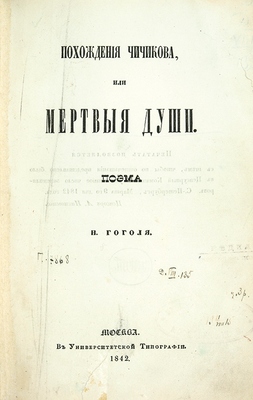
I decided to read some Russian classics. The book is about people and society. The book dates to the 19th century. However, it is still relevant today. The social aspect of the society did not evolve as quickly as the technology.
Crucial Conversations: Tools for Talking When Stakes Are High
by Al Switzler, Joseph Grenny, and Ron McMillan

Crucial Conversations is a very practical book. You can apply knowledge in everyday life straight after reading it. As you probably know our life is not always vanilla. Quite often we need to deal with people who completely disagree with our opinion. Whether it be your boss, partner, neighbour or co-worker. This book teaches you how to have those conversations without alienating the relationship. The book is very insightful and I feel I need to read it again to better understand it.
I definitely recommend the book for everybody and I wish everybody to have a read of it.
Lincoln
by Al Switzler, Joseph Grenny, and Ron McMillan

It’s loooooong, very long, 30+ hours long. I can’t count the number of times I thought to stop listening to it but somehow I managed to finish it.
Such level of details is acceptable at court when creating a criminal record. Let me ask you, would you be interesting in reading the criminal records? Nobody cares who said what, to who and at what minute. The readers want a story, a good story with overview of what’s happening. Unfortunately this book pollutes a good story with unnecessary details.
One advice to you is to listen to this audiobook on x1.5 speed, I started with x1.25, and it wasn’t fast enough. You get bored faster than your patience for the author’s mumbles.
Sapiens: A Brief History of Humankind
by Yuval Noah Harari

First of all, great book and now the details. I thought it was a book about biology and how humans evolved from monkeys. It definitely has a lot of it, but that’s only a small portion of the book.
While I was reading it I realised the book 100% proves its title. Think about some time in year 3000 or perhaps when aliens colonise the earth. They would want to study the creatures which were living on the planet. I think this book speaks about us more than anything. The author manages to distance himself and you truly think it’s just another history book.
It is a pretty long book, at times it could be boring because of the details, but only sometimes. This is one of the best book I’ve read and I definitely would read it again.
99 bottles of OOP
by Sandi Metz & Katrina Owen
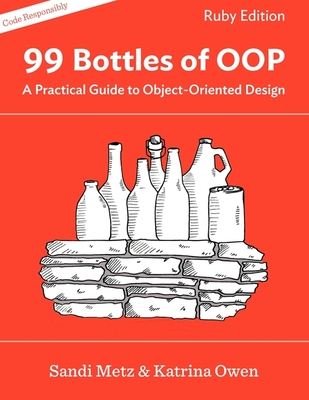
This book is very hyped this year. To summarise it's a detailed refactoring tutorial. It could also be called "Refactoring 1-on-1 for dummies".
I like that it goes through long and tedious process of proper TDD. I don't like for the exactly same reason and had to skim through it. People who are not familiar with TDD should find it very useful.
The book was a good detailed reminder of the refactoring process for me. However I wouldn't recommend it to myself.
Growing Rails Applications in Practice
by Henning Koch and Thomas Eisenbarth
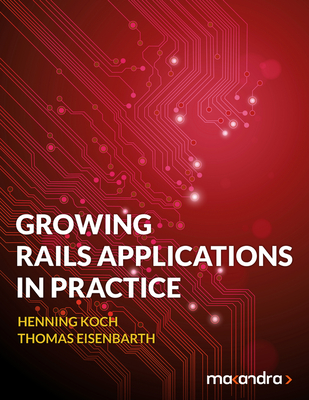
A quick read which I would recommend to every mid rails developer and higher. It's common for developers to outgrow their tools. Rather than learn new skills, people start to blame the tools. Your heard those people: "Rails does not scale", "ActiveRecord is antipattern" etc. The books show few patterns which allow to build big Rails application with only small changes to standard 'Rails way'.
The book recommends active_type gem. I would recommend other gem active_interaction instead. active_interaction gem is more superior in my opinion and I've successfully used it in multiple projects over the last 2 years.
As for the CSS structuring, BEM is definitely a good choice to get control over your styles. Only issue with it, if not enforced it loosed its value, so every developer should be very diciplined to follow BEM.
There is only 1 option which is better than BEM, it's css modules. I only used it with ember.js, not Rails though. It automates steps that you have to do with BEM. However css modules require deep integration into the tools you use, which makes it harder to bring into the project.
Sprint
by Jake Knapp

The book talks about the process of running a 5 day long test to validate your idea/product. You might have an idea to start new business or how to engage your existing customers, whatever it is you should do as quickly as possible and as effectively as possible.
The book provides a very detailed step by step guide how to run the full spring as well as explains why things are done the certain way.
While books tries to prove itself with examples from big or popular companies, it feel a bit cheap because success of the company doesn't depend on the success of the product. It's way more complex than that.
I'll be very interested to try it in practice. In theory it should work very well.
The Art of Readable Code
by Dustin Boswell & Trevor Foucher
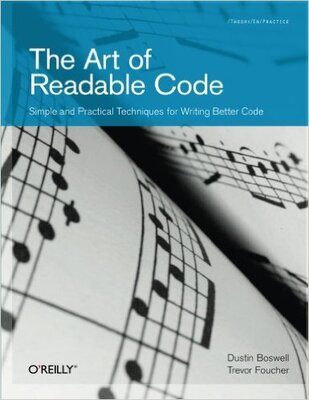
This quick and easy to read book I would recommend to every developer. It talks about all the little things which are often neglected and what developers deal with every day. Naming methods and variables, extracting business logic, code comments, aesthetics and code readability.
This knowledge is language agnostic and the best mastered over reading lots of code, or reading this book :)
The Inner Game of Tennis
by Timothy Gallwey

That was a lucky pick to read after "The Brain's Way of Healing". That book talks about unconscious part of the brain. It does make a lot of sense and I've drew a lot of parallels with the "The Flow" book. To put it simply, we are animals and millions years of evolution didn't disappear when we've got consciousness.
When we are leaning something we actually teaching our unconscious part of the brain, while consciousness is there to guide that learning process.
Conscious and unconscious, this is just a theory to explain our body, and probably not very accurate. But it is enough to start benefit from it. That book shows how little we know about ourselves.
The Brain's Way of Healing
by Norman Doidge

This an amazing book. Just like the previous book "The Brain that Changes Itself" this one also blew my mind. It's very long book and I think I've lost my interest twice and had to start again from the start few months after. But once i've got beyond the first 30% about Parkinson Disease, I was hooked.
The book talks about how brain stimulation through our sensor could affect it. That includes voice, light and touch. That's probably my favourite part.
Anyway, I've read it over a month ago now and my excitement already dimmed out. That's a great book and I would recommend it to everyone.
Remote
by Jason Fried and David Heinemeier Hansson

Just like the book I've read a week before - "Rework", this book also jumped the queue.
So are you working remote or still going to the office five days a week?
If you are working at the office, you might need to read this book, to know why it make sense to switch to remote or ocasional remote work. The book addresses some questions and concerns about remote work. There are definitely more pros than cons to working remotely, however it's important to know and understand the difficulties that arise and which are previously were unknown to office workers.
If you are already working remotely, you'll probably find this book as a reflection of your own experience. I've been working remotely for over 5 years and gone through the exactly same struggles described in the book. I guess the only difference the book looks at it with a bit more scientific perspective.
I feel the book could be even shorter, few ideas has been repeated multiple times through the book. If you want to know everything about remote work this book is definitely would be the first goto option.
Rework
by founders of 37signals
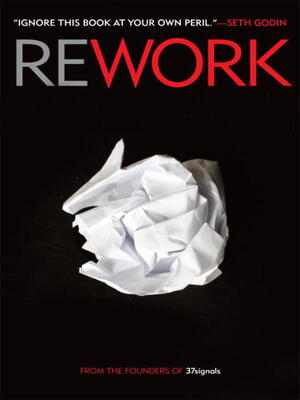
I had to use my credits on Audible.com and didn't know what to buy. This book was on my to read list, but somewhere at the bottom of it. And thanks to very small collection of audiobooks this book jumped the queue.
The first thing that surprised and warned me at the same time how small the book is. It is relatively short and is less than 3 hours long. In comparison the other book I'm reading, "The brain's way of healing", is almost 15 hours long. But there is a good reason why it is like that. Authors intentionally cut on the content as it's the same principle they use at work, which was described in the book.
To sum up the book, it could also be called "Rethink". Rethink things that you are doing at work. Just because something was done in a particular way for a long time does not mean it is a good idea to keep doing it.
The book summarises years of work at 37signal, company which indeed swims agains the flow and decided not to follow many established work practices.
Can't say I've learnt much, as I've heard many of those things before, but nevertheless I've enjoyed this book.
Update: I re-read it in 2024
Lean Startup
by Eric Ries

It's an interesting book which summed up a lot of my experience working in startups. It's important to mention that the book focuses on testing new ideas rather than improving existing business.
Alright, so you have a new business idea and nobody has done it before, what's next? In short accept that you are wrong and your ideas are crap and proceed from there. Such mindset forces you to focus on feedback. Even if you found great market fit with 80% accuracy you still need feedback to make the adjustments.
The whole process should be focused on getting the market feedback and learning from it. The challenge is to get it as fast as possible and as cheap as possible. The sooner you fail the faster you will learn and the faster you will move on to a better one.
As a professional software developer I've found such approach very hard, because as a professional I'm responsible of quality, which I had to ignore if it conflicts with the delivery speed.
Also I've found my peers who don't understand that principle of growing new ideas, set the wrong priorities on tasks. They focus on the tasks which have medium to low business value, which is still not acceptable as that distracts you from the low hanging fruits.
I've also liked the "vanity metrics". Metrics which has no real meaning but makes you feel good by creating an illusion. So many businesses keep doing it. So true.
Lean Startup book was written from the author’s experience and I can personally backup most of the things mentioned in the book with my personal experience. That's why I've found it very useful as I see it as an experience exchange.
I'd say Lean Startup is "must read" only if you are starting new business, otherwise you are better off reading books on improving efficiency or quality of your existing business.
Links:
Atlas Shrugged
by Ayn Rand
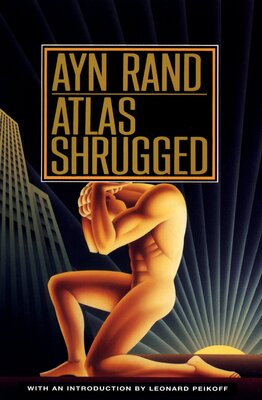
Great novel, it's one of those which I could not wait to listen again. The audiobook was done with amazing quality, it's not a plain reader reading the book, but with different voices and sound effects. It's like watching a movie without a picture. Very cool. It's a completely new level of the audiobooks.
Novel itself has a lot of meaning and I think shows world quite accurately. I was enjoying every moment while listening to it.
On the negative sides, there are few obvious issues which break the flow of the story for me. I've got three:
-
Very often and out of the context the different characters say "Who is John Galt?". Since it's out of the context it's very clear the author added it to glue the ending. That completely breaks the flow. Such out of the context sentences work as a wake up call for the readers immersed into the story.
-
Love relationship is very unrealistic. It's hard for me to believe that multiple man who finally met the true love of their life could not care and say something like - ah cool, no problem. I love you more than anything in this world, but i'm cool to be friends. We can live and see each other everyday. I will love you forever but you can be with that other guy.
-
The final speech from John Galt over the radio was waaaay too long. It felt like that speech was written first and the rest of the story was added as an addition. The speech repeats the same idea many times and could be much shorter or broken into multiple parts during the story.
The novel had a big influence for people, that's why it spiked my interest to read it. Now I know the story, I'm interested to see what was the influence.